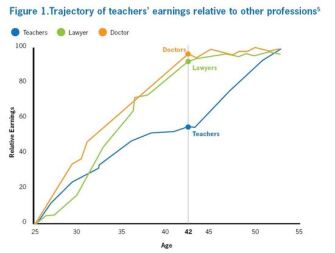Updated
A new report from the National Council on Teacher Quality dissects salary schedules from across the nation’s biggest school districts to find where teachers can maximize their salaries the quickest.
NCTQ, a Washington-based research and advocacy group, uses the findings to suggest that districts improve salary structures to better reward standout teachers.
“Are the highest performers truly separated from those who are not as successful?” the authors write. “Exemplary teachers have set themselves apart from their peers; can the same be said of their pay?”
Teacher salary growth is, as I’ve written before, generally weak in the United States relative to other countries, and when salary grows slowly, that creates an adverse effect on retirement, too; the more money you make earlier in your career, the more you can invest for the future. And in that regard, teachers are much worse off than doctors or lawyers, the NCTQ report indicates:

Districts showed wide discrepancies in how quickly teachers could reach a $75,000 salary, which is the average district maximum, according to NCTQ’s calculations. On average, the report says, it takes teachers 24 years to reach their maximum pay. In Boston, it takes just seven years. In Oklahoma City, it takes 31 years—or almost the entire length of a teacher’s career:

The District of Columbia, which gives its highest-rated teachers up to $131,540, stood out as a clear winner in terms of top salary, as it has in previous reports from the Center for American Progress and Wallet Hub. That’s in no small part due to the district’s IMPACTplus program, which offers major bonuses based on measures of performance. The NCTQ report indicates that Washington teachers can make it to their maximum in under a decade.
Columbus, Ohio, meanwhile, receives praise for having the most “bang for the buck,” with the highest adjusted salary ($102,095) that can be earned in the shortest amount of time (10 years).
The report ranks Newark, Hawaii, and San Francisco dead last in overall salary because NCTQ accounts for cost-of-living adjustments. According to the report, it takes over 30 years to reach maximum salary in those districts, too.*
But cost-of-living adjustments may be misleading in some cases. For example, the actual starting salary for a teacher in San Francisco is $47,425. NCTQ uses a cost-of-living adjustment to make this $29,244 compared to the average district. This is fair in the sense that San Francisco is—to use a scientific term—stupid expensive, but it also assumes that teachers live in the districts in which they work, and there’s no data to back that up in the report. Saying that a teacher in New York City maxes out at $56,767 (adjusted) is a huge leap from saying they max out at $100,391 (unadjusted), because an N.Y.C. teacher could reasonably live in one of the less-expensive surrounding areas, like Newark. NCTQ provides a full unadjusted list in the report’s appendices.
NCTQ is a prominent advocate for changes to the teaching profession, using reports on teacher prep, alternative certification, and now teacher salary, for instance, to critique current practices. NCTQ has drawn no shortage of scorn for its approach to such issues, which have involved disputed uses of data in the past. This report remains largely quiet about specific solutions to teacher-salary issues, however, apart from stating that high quality educators should be able earn more in a shorter period of time.
There are performance models that go beyond test-related accountability, though the report doesn’t delve into these. Baltimore teachers, for instance, advance up their career ladders by completing certain professional achievements and undergoing peer-reviewed performance tasks. In Tennessee, select groups of teachers for whom test scores aren’t available (like in the arts) use portfolio systems.
*UPDATE: NCTQ corrected some of its inflation-adjusted numbers after the initial press version of the report went out. Under the corrected version, Neward now ranks last in inflation-adjusted cost of living, and San Francisco and New York City teachers now have higher salaries (also adjusted), but still rank near the bottom.
Images courtesy of NCTQ.